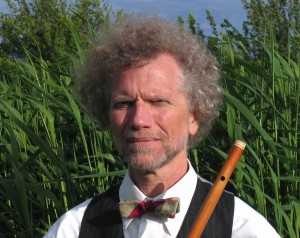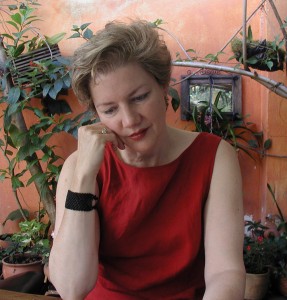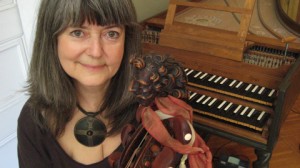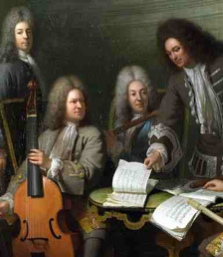Saturday, May 3, 7 p.m., Orcas Adventist Fellowship Church
— from Jeffrey Cohan —
 The Salish Sea Early Music Festival presents harpsichordist Elisabeth Wright, viola da gambist Susie Napper and baroque flutist Jeffrey Cohan in SIMPHONIE, a program of the most well- known baroque trio sonatas for these instruments by Johann Sebastian Bach, Jean Philippe Rameau, Jean-Marie Leclair, Francois Couperin and D’Anglebert on Saturday, May 3 at 7:00 PM at the Orcas Adventist Fellowship Church in Eastsound.
The Salish Sea Early Music Festival presents harpsichordist Elisabeth Wright, viola da gambist Susie Napper and baroque flutist Jeffrey Cohan in SIMPHONIE, a program of the most well- known baroque trio sonatas for these instruments by Johann Sebastian Bach, Jean Philippe Rameau, Jean-Marie Leclair, Francois Couperin and D’Anglebert on Saturday, May 3 at 7:00 PM at the Orcas Adventist Fellowship Church in Eastsound.
This ensemble was one of the first to represent the Northwest early music scene in Europe as the Seattle Baroque Trio three decades ago. The program will be repeated in Friday Harbor on May 3 at 11:00 AM and on Lopez Island on May 4 at 2:00 PM as follows:
Complete performance schedule for Simphonie:
- San Juan Island: Saturday morning, May 3, 2014 at 11:00AM (coffee concert!) · San Juan Island Grange · 152 – 1st Street in Friday Harbor · 378-6632
- Orcas Island: Saturday evening, May 3, 2014 at 7:00 PM · Orcas Adventist Fellowship Church · 107 Enchanted Forest Road in Eastsound · (360) 376-6683
- Lopez Island: Sunday afternoon, May 4, 2014 at 2:00 PM · Grace Church · 70 Sunset Lane · (360) 468-3477
~-~-~-~-~
The program will include Jean-Marie Leclair’s well-known Trio Sonata, Opus 2, No. 8 for viola da gamba, flute and continuo; Johann Sebastian Bach’s Trio Sonata for viola da gamba and flute, transcribed for this performance from Bach’s two versions for viola da gamba solo with obbligato harpsichord, and for two flutes and continuo; François Couperin’s Second Concert from Concerts Royaux, which were often performed for Louis XIV before 1715 and published in 1722; the Cinquième Concert for obbligato harpsichord with the accompaniment of viola da gamba and flute from Jean-Philippe Rameau’s Pieces de Clavecin en Concerts (1741); and harpsichord solos by Jean-Henri D’Anglebert.
“… the reward was as dreamily exquisite as an invitation from Oberon, delivered by Puck himself to enter a world of tender and brilliant magic.”
“A music so refined, it draws and draws, yet never swamps the senses.”
“…virtuosity and technical brilliance … spell-binding … I couldn’t be quite sure I hadn’t dreamed it all.” —Music in Victoria (from February’s Salish Sea Early Music Festival program)
During the reign of Louis XIV, “Simphonie” (there were several spellings) referred simply to chamber music for any number of players – as few as two – and often included instrumental transcriptions of orchestral and vocal repertoire. The composer and violinist Jean-Féry Rebel spent his formative years during this period, and four decades later in 1737 when he was 71 and the “simphonie” had gone quite out of fashion, Rebel crafted a “new” mode for it: a wild, programmatic and cohesive set of pieces depicting the creation of the world, which he entitled “Les Élémens, simphonie nouvelle”. Jeffrey Cohan’s and the Salish Sea Early Music Festival’s Simphonie Nouvelle follows Rebel’s lead in conjuring up a new presence for the “Simphonie” and other elements of baroque music, while affirming the grand overtones of ancient forms that often assume a more straight-forward role today.
~-~-~-~-~
 Harpsichordist and fortepianist Elisabeth Wright is a founding member of The Seattle Early Music Guild and professor at Indiana University’s Jacobs School of Music in Bloomington. Following graduate studies with Gustav Leonhardt in Amsterdam, she has maintained a distinguished career performing in such noted venues as Boston and Berkeley Early Music Festivals, Mostly Mozart, Tanglewood, Aston Magna, Lufthansa of London, Vancouver Early Music, Tage alter Musik, Sydney Festival, Festival Cervantino, Musica Antica Bolzano, Festival de Estella, Stour Music Festival, and the Brazilian festivals, Performa Clavis and Semana de Música Antiga. A member of Duo Geminiani with violinist Stanley Ritchie, she has also performed and recorded with Música Ficta, and with many artists of international renown. Soloist with Tafelmusik, Lyra, Seattle, Portland and Indianapolis Baroque Orchestras, she has been broadcast on four continents and recorded for Classic Masters, Milan-Jade, Focus, Arion, Arts Music, Centaur, and Música Ficta Recordings.
Harpsichordist and fortepianist Elisabeth Wright is a founding member of The Seattle Early Music Guild and professor at Indiana University’s Jacobs School of Music in Bloomington. Following graduate studies with Gustav Leonhardt in Amsterdam, she has maintained a distinguished career performing in such noted venues as Boston and Berkeley Early Music Festivals, Mostly Mozart, Tanglewood, Aston Magna, Lufthansa of London, Vancouver Early Music, Tage alter Musik, Sydney Festival, Festival Cervantino, Musica Antica Bolzano, Festival de Estella, Stour Music Festival, and the Brazilian festivals, Performa Clavis and Semana de Música Antiga. A member of Duo Geminiani with violinist Stanley Ritchie, she has also performed and recorded with Música Ficta, and with many artists of international renown. Soloist with Tafelmusik, Lyra, Seattle, Portland and Indianapolis Baroque Orchestras, she has been broadcast on four continents and recorded for Classic Masters, Milan-Jade, Focus, Arion, Arts Music, Centaur, and Música Ficta Recordings.
Wright is in frequent demand for master classes and seminars pertaining to performance practices of music from late 16th – 18th century. She contributed a chapter about the musical settings of texts by Giambattista Marino together with a recording in “The Sense of Marino: Literature Fine Arts and Music of the Italian Baroque, and served as translator for Max Sobel’s edition of the complete works of Francesco Bonporti. A reviewer for Early Keyboard Journal, she was also a founding member of Bloomington Early Music, and has served on the board of Early Music America and as panelist for the National Endowment for the Arts, PEW, and PennPat.
 Cellist, gambist, continuo player par excellence, Susie Napper is known for her colorful, even controversial performances of both solo and chamber repertoire of the 17th and 18th centuries. Having spent her childhood in an artistic milieu in London, in her late teens she moved to New York to study at the Juilliard School, then to the Paris Conservatoire. San Francisco followed, where, after a foray into contemporary music, she co-founded and directed the Philharmonia Baroque Orchestra. Since then she has spent two decades with a foot on either side of the Atlantic as principal cellist with several groups including Stradivaria in France, the Studio de Musique Ancienne de Montréal and Les Boréades in Montreal, and the Trinity Consort of Portland. Her concert tours have taken her as far afield as China, Japan, New Zealand, India, the Middle East, as well as most European countries. As a member of the very active viol duo Les Voix humaines, she has discovered a new facet of musical expression in the form of musical arranging, thus providing an endlessly fascinating new repertoire for two viols. Susie Napper teaches at McGill University, and founded the Festival international Montréal Baroque which is presented in Montreal in June since 2001. She was awarded the «Prix Opus» 2002 for «Personality of the year» by the Conseil québécois de la musique.
Cellist, gambist, continuo player par excellence, Susie Napper is known for her colorful, even controversial performances of both solo and chamber repertoire of the 17th and 18th centuries. Having spent her childhood in an artistic milieu in London, in her late teens she moved to New York to study at the Juilliard School, then to the Paris Conservatoire. San Francisco followed, where, after a foray into contemporary music, she co-founded and directed the Philharmonia Baroque Orchestra. Since then she has spent two decades with a foot on either side of the Atlantic as principal cellist with several groups including Stradivaria in France, the Studio de Musique Ancienne de Montréal and Les Boréades in Montreal, and the Trinity Consort of Portland. Her concert tours have taken her as far afield as China, Japan, New Zealand, India, the Middle East, as well as most European countries. As a member of the very active viol duo Les Voix humaines, she has discovered a new facet of musical expression in the form of musical arranging, thus providing an endlessly fascinating new repertoire for two viols. Susie Napper teaches at McGill University, and founded the Festival international Montréal Baroque which is presented in Montreal in June since 2001. She was awarded the «Prix Opus» 2002 for «Personality of the year» by the Conseil québécois de la musique.
Her recordings, which include most of the known repertoire for two viols, can be heard on Harmonia Mundi, EMI, Erato, ADDA, CBC Records, Naxos, and most notably on the ATMA label.
ADMISSION: suggested donation: $15 or $20, 18 & under free, students $5. FOR MORE INFO: www.salishseafestival.org.
**If you are reading theOrcasonian for free, thank your fellow islanders. If you would like to support theOrcasonian CLICK HERE to set your modestly-priced, voluntary subscription. Otherwise, no worries; we’re happy to share with you.**








